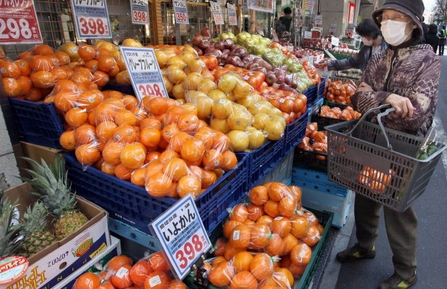
When Marubeni Corp. announced in May it plans to launch services that will make it possible for people in Asia to purchase Japanese fruit and vegetables with just one click, it received dozens of phone calls from potential domestic partners, including prefectures keen to sell their local produce.
Japan lacks solid channels to export fresh food, the firm realized.
Under the plan, people in southern China, Taiwan and Macau will be able to order Japanese farm produce and other types of food online or through TV shopping programs next year. Marubeni wants to eventually expand the service to Southeast Asia.
“We see this project as the first step for a global distribution system that we plan to establish,” Komei Kondo, deputy general manager at Marubeni’s agricultural products department, said, adding the company hopes to eventually expand into the Middle East and northern Africa.
Unlike long-protected domestic farmers who feel threatened by the Trans-Pacific Partnership trade accord, which aims to eliminate tariffs, corporate Japan is gearing up to take advantage of an expected jump in cross-border trade as well as from Prime Minister Shinzo Abe’s growth strategies, which aim to expand food exports to ¥1 trillion by 2020 from about ¥450 billion in 2012. The government estimates that if the TPP removes tariffs immediately, it would increase Japan’s exports by ¥2.6 trillion and its imports by ¥2.9 trillion.
Rather than clinging to the shrinking domestic market and its aging population, companies hope to enter fast-growing foreign markets. They also want to tap businesses that don’t directly entail trade with Japan.
“What we are thinking about is something like AmazonFresh is doing,” Kondo said, referring to the unit of Amazon.com Inc. that in 2007 started home deliveries of groceries and other products first in Seattle and this year in Los Angeles. The service is expected to target wider areas beyond the United States in the future.
In addition to high-quality Japanese fruit, including grapes, peaches and pears, Marubeni, which engages a wide range of business partners, including retailers and trucking companies, believes there is potential for strong demand for Japanese sweets, precooked rice and baby food among high-income households around Asia.
Kondo expects sales from the service to reach at least ¥30 billion by 2015 and more than ¥100 billion by 2020.
For its initial foray in China, Marubeni will tie up with Hong Kong Satellite TV International Media Group, a Chinese state-owned company, to ensure the service runs smoothly. It will also build a central warehouse for food in Okinawa and a distribution center in Hong Kong.
Trading houses Itochu Corp. and Sumitomo Corp. are also looking to boost their home shopping business, but at present only for nonfood products.
Logistics firms meanwhile also expect the TPP to boost the global food trade and hope to get a piece of the pie.
Nichirei Logistics Group Inc., the country’s top cold warehousing firm and a unit of frozen food maker Nichirei Corp., hopes to both bring in cheaper perishables to Japan and expand its distribution business abroad.
In September, it plans to launch temperature-controlled food deliveries in Thailand, where it set up a joint venture in June with Siam Cement Public Co., a distribution and export firm.
Nichirei plans to deliver refrigerated goods in Thailand, transport domestic products within the country, and export produce from Thailand, including shrimp, poultry and pineapples, to Japan and Europe.
“The prime reason Nichirei is embarking on this project is that the Japanese market is saturated,” company spokesman Koji Morimoto said, welcoming the TPP because it will help increase cross-border trade.
Yamato Holdings Co. is building what will be its largest logistics terminal near Tokyo’s Haneda airport, anticipating that trade to and from emerging Asian economies will increase if Japan joins the TPP.
The warehouse, Haneda Chronogate, will not only support distribution channels for farm produce when it starts operations in September, but also expedite the supply chains of Japanese manufacturers of electronics goods, digital gadgets, medical appliances and other retail products, the company said.
Although logistics companies hope to benefit from freer global trade, they can expect to face stiff competition from well-established global rivals, experts said.
Giants include Germany’s DHL and UPS of the United States, both of which cover all-round transportation services from ocean, rail and air freight to trucking and warehousing. Their business scale is far greater than their Japanese counterparts, said Hitoshi Iwasaki, chief research fellow at International Logistics Research and Solution.
Many Japanese companies that depend solely on the domestic market, where some 60,000 trucking companies operate, will face a fall in demand as the population continues to shrink, experts said.
“Companies will not survive without global business because the domestic transport of goods is rapidly shrinking,” said Takahiro Wakana, assistant manager of public management consulting at Nomura Research Institute.
“The number of mergers and acquisitions in the industry will increase in the next five to 10 years,” he said, referring to moves such as Hitachi Transport System Ltd.’s purchase of James J. Boyle & Co. of the United States to survive the global competition.





